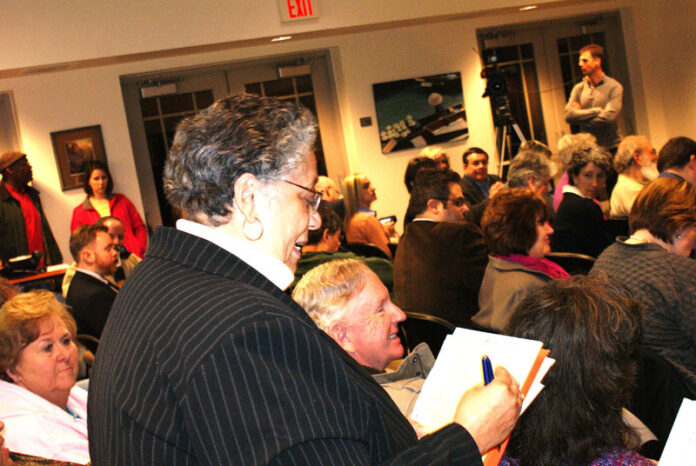
by Gene Marrano
A bill to take redistricting out of the hands of politicians died in the General Assembly this past session, but Governor Bob McDonnell set up a blue ribbon committee that is seeking input from the public at a series of hearings.
That bipartisan panel stopped in Roanoke earlier this week, where a packed room at Virginia Western gave them an earful.
Among the thoughts expressed: keep the Roanoke Valley intact if possible, don’t split among several Congressional or legislative districts – and stop the politically based gerrymandering, which ten years ago put local Democratic lawmakers Dick Cranwell and Chip Woodrum in the same district.
Looking for “Communities of Interest,” is a goal – keeping localities and natural regions in the same districts when possible. The law mandates that the population of each district created be roughly equal, which is why the 5th, 6th and 9th Congressional districts are sprawling entities.
State Senator Ralph Smith (R-Botetourt County) and Delegate Onzlee Ware (D-11th House District) were on hand, as were a handful of other political operatives and members of the local Tea Party.
6th District Democrat chair Linda Wyatt asked that the 6th Congressional District, which includes Roanoke City, not be so closely aligned with the more rural 9th, which creeps into Salem and Western Roanoke County.
Roanoke is ‘the big city,” noted Wyatt, a former Roanoke City council member, and it is “not comfortable,” being aligned with the 9th district, which should add people from the more rural counties that surround it,” she added.
“We’re just as anxious about this process as anyone else,” noted Ware, who called the Roanoke Valley “special.” He then added, “I understand we have to add people but I hope it preserves [the character] of the Roanoke Valley.”
Steve Mabry, who ran Smith’s campaign for the Senate, called the Roanoke Valley a community of interest: “we very strongly want to underscore that. I’m hoping you can keep us together.” Regarding the state’s House districts, Mabry drew chuckles when he added that, “it would be nice if they had some semblance of rationality.”
Waynard Caldwell of Vinton asked about the counting of prisoners at the regional jail as part of the local census, as did several others.
“We’re now going to have to move a voting precinct [because of that],” noted Caldwell. Members of the panel, chaired by former Virginia Commonwealth University professor Bob Holsworth, said the issue of where prisoners should be counted in the census would require further study.
Roanoke NAACP chapter president Brenda Hale asked that redistricting not “fracture,” the valley. “Roanoke City is a very unique community,” noted Hale, who also asked that there be no “packing” or “stacking” of new legislative districts that dilute minority voters or lessen their impact on the voting process. “We don’t want to fracture anybody,” said Hale; “we hope the governor will listen to you.”
The panel must report back to Richmond by early April. The General Assembly will take up the matter after the veto session; their final decision will then be forwarded to the U.S. Department of Justice, which has 60 days to approve the plan.
Roanoke City resident Barbara Duerk commented that the highly partisan redistricting process in the past has left many voters feeling helpless: “They feel like they can’t make a difference. Democracy is not a spectator sport.”
As part of the redistricting process this year groups of students from 15 colleges around the state are putting together their own non-partisan maps, leaving politics out of it. They will be on display in Richmond next week.
Roanoke College student Anne Whitesell showed off her school’s entry. Looking for “contiguity and compactness,” in districts with 80,000 residents each across the state, Whitesell admitted that the process was difficult. “You do have to carve things up. It sounds really simple when you start.”
One comment perhaps summed up a common sentiment in the room. “I think gerrymandering should be outlawed,” said one speaker, “it’s a travesty of the democratic process.”


